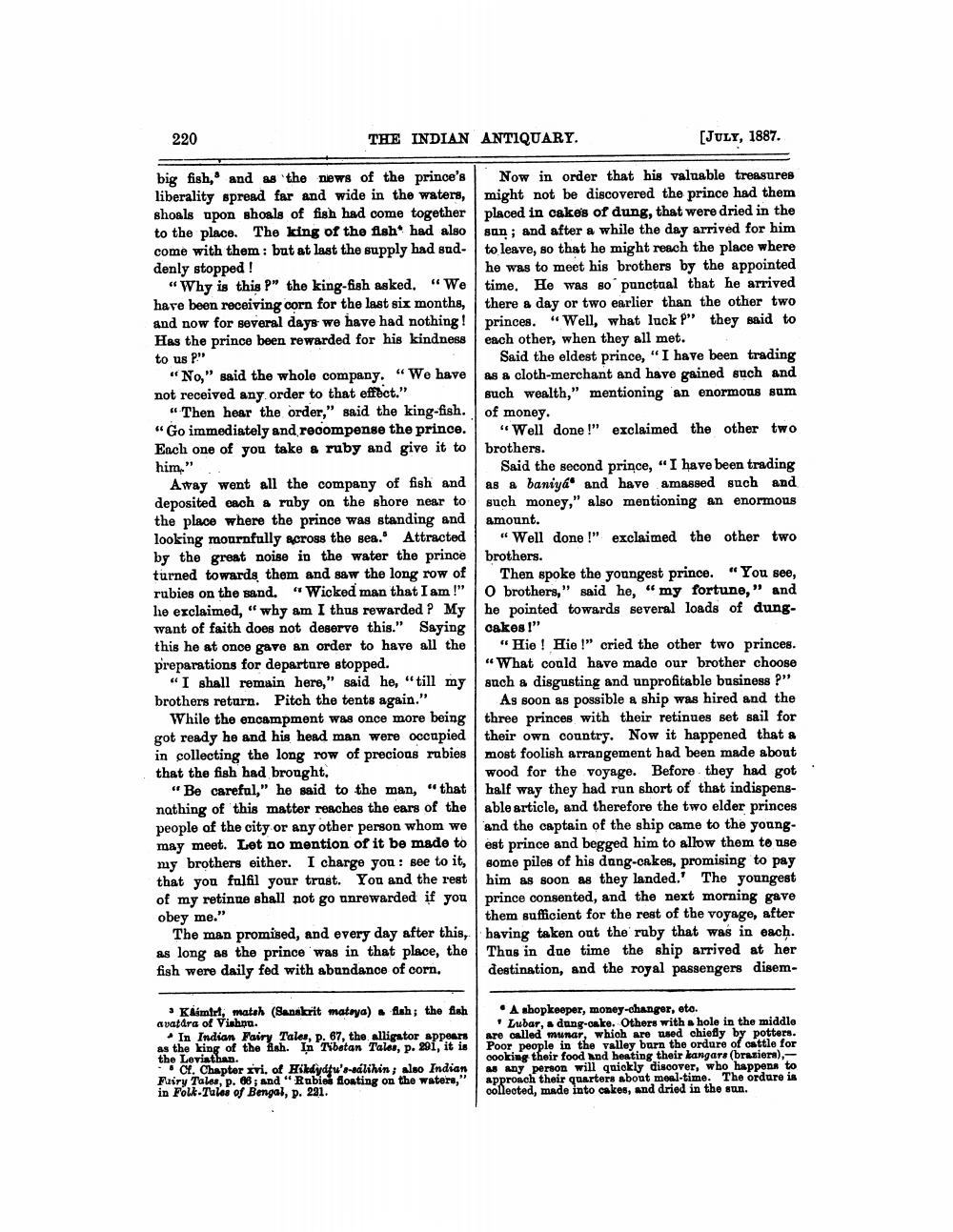________________
220
THE INDIAN ANTIQUARY.
[JULY, 1887.
big fish, and as the news of the prince's Now in order that his valuable treasures liberality spread far and wide in the waters, might not be discovered the prince had them shoals upon shoals of fish had come together placed in cakes of dung, that were dried in the to the place. The king of the fish* had also san; and after a while the day arrived for him come with them : but at last the supply had sud- to leave, so that he might reach the place where denly stopped !
he was to meet his brothers by the appointed “Why is this p" the king-fish asked. “We time. He was so punctual that he arrived have been receiving corn for the last six months, there a day or two earlier than the other two and now for several days we have had nothing ! princes. “Well, what luck p" they said to Has the prince been rewarded for his kindness each other, when they all met. to us P."
Said the eldest prince, "I have been trading "No," said the whole company. “We have as & cloth-merchant and have gained such and not received any order to that effect."
such wealth," mentioning an enormous sum « Then hear the order," said the king-fish. of money. “Go immediately and recompense the prince. "Well done!" exclaimed the other two Each one of you take a ruby and give it to brothers. him."
Said the second prince, “I have been trading Away went all the company of fish and as a baniya and have amassed such and deposited each & ruby on the shore near to such money," also mentioning an enormous the place where the prince was standing and amount. looking mournfully across the sea. Attracted "Well done!" exclaimed the other two by the great noise in the water the prince | brothers. turned towards them and saw the long row of Then spoke the youngest prince. "You see, rubies on the sand. "Wicked man that I am!" O brothers," said he, "my fortune,” and le exclaimed, "why am I thus rewarded ? My he pointed towards several loads of dungwant of faith does not deserve this." Saying cakes!" this he at once gave an order to have all the "Hie! Hie!" cried the other two princes. preparations for departure stopped.
“What could have made our brother choose “I shall remain here," said he, "till my such a disgusting and unprofitable business ?" brothers return. Pitch the tents again."
As soon as possible a ship was hired and the While the encampment was once more being three princes with their retinues set sail for got ready he and his head man were occupied their own country. Now it happened that a in collecting the long row of precious rubies most foolish arrangement had been made about that the fish had brought.
wood for the voyage. Before they had got "Be careful," he said to the man, “that half way they had run short of that indispensnathing of this matter reaches the ears of the able article, and therefore the two elder princes people of the city or any other person whom we and the captain of the ship came to the youngmay meet. Let no mention of it be made to est prince and begged him to allow them to use my brothers either. I charge you : see to it, some piles of his dang-cakes, promising to pay that you fulfil your trust. You and the rest him as soon as they landed.' The youngest of my retinde shall not go anrewarded if you prince consented, and the next morning gave obey me."
them sufficient for the rest of the voyage, after The man promised, and every day after this, having taken ont the ruby that was in each. as long as the prince was in that place, the Thus in due time the ship arrived at her fish were daily fed with abundance of corn. destination, and the royal passengers disem
• Klimiet, match (Sanskrit mataya) fish; the fish avatara of Vishnu.
In Indian Fairy Tales, p. 67, the alligator appears as the king of the fish. In Tibetan Talon, p. 291, it is the Leviathan.
CF. Chapter xvi. of Hikdydfu's-salihin; also Indian Fairy Tales, p. 08; and "Rubied floating on the waters," in Folk. Tules of Bengal, p. 221.
• A shopkeeper, money-changer, eto.
Lubar, a dang-cake. Others with a hole in the middle are called munar, which are used chiefly by potters. Poor people in the valley burn the ordure of cattle for cooking their food and heating their langars (brasiera),as any person will quickly discover, who happens to approach their quarters about meal-time. The orduro in collected, made into cakes, and dried in the sun.




